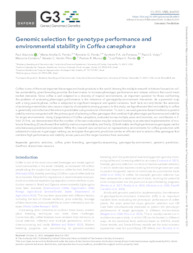Genomic selection for genotype performance and environmental stability in Coffea canephora.
Genomic selection for genotype performance and environmental stability in Coffea canephora.
Author(s): ADUNOLA, P.; FERRÃO, M. A. G.; FERRÃO, R. G.; FONSECA, A. F. A. da; VOLPI, P. S.; COMÉRIO, M.; VERDIN FILHO, A. C.; MUNOZ, P. R.; FERRÃO, L. F. V.
Summary: Coffee is one of the most important beverages and trade products in the world. Among the multiple research initiatives focused on coffee sustainability, plant breeding provides the best means to increase phenotypic performance and release cultivars that could meet market demands. Since coffee is well adapted to a diversity of tropical environments, an important question for those confronting the problem of evaluating phenotypic performance is the relevance of genotype-by-environment interaction. As a perennial crop with a long juvenile phase, coffee is subjected to significant temporal and spatial variations. Such facts not only hinder the selection of promising materials but also cause a majority of complaints among growers. In this study, we hypothesized that trait stability in coffee is genetically controlled and therefore is predictable using molecular information. To test it, we used genome-based methods to predict stability metrics computed with the primary goal of selecting coffee genotypes that combine high phenotypic performance and stability for target environments. Using 2 populations of Coffea canephora, evaluated across multiple years and locations, our contribution is 3-fold: (1) first, we demonstrated that the number of harvest evaluations may be reduced leading to accelerated implementation of molecular breeding; (2) we showed that stability metrics are predictable; and finally, (3) both stable and high-performance genotypes can be simultaneously predicted and selected. While this research was carried out on representative environments for coffee production with substantial crossover in genotypic ranking, we anticipate that genomic prediction can be an efficient tool to select coffee genotypes that combine high performance and stability across years and the target locations here evaluated.
Publication year: 2023
Types of publication: Journal article
Unit: Embrapa Coffee
Keywords: Coffea Canephora, Genomics, Genotype, Plant breeding, Prediction
Observation
Some of Embrapa's publications are published as ePub files. To read them, use or download one of the following free software options to your computer or mobile device. Android: Google Play Books; IOS: iBooks; Windows and Linux: Calibre.
Access other publications
Access the Agricultural Research Database (BDPA) to consult Embrapa's full library collection and records.
Visit Embrapa Bookstore to purchase books and other publications sold by Embrapa.

